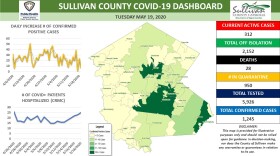New York Governor Andrew Cuomo has given the Capital Region the go-ahead to begin reopening from coronavirus shutdowns Wednesday, a bit of news county leaders have been wishing for.
Cuomo's directive came after identifying the required amount of contact tracers. Rensselaer County Executive Steve McLaughlin:
"You know, we're working hard through the eight-county region to get reopened as fast as we can. The last metric that we needed was the contact tracers. Dan McCoy over in Albany put in 200. We put in 52, I think Mayor Sheehan put in 75 and then the other counties are pitching in as well. So I'm not exactly sure what there's numbers are but we should be way way over the top by today as far as content tracers go. It was good to see the state, you know kind of back off on what were some wrong hospitalization numbers. They were just calculating the numbers incorrectly."
McLaughlin says the correction was key to expediting the Capital Region's reopening plan.
County Manager Rory Fluman says Schenectady met the tracing metric over a week ago.
"Contact tracing remember, it's an investigation. Each notification we get from the State Health Department says, OK, 'Bob Smith has it.' Well immediately, it's up to the local Office of Public Health to call Bob Smith. So our existing contact tracers in our Schenectady County Office of Public Health calls Bob Smith. Now if Bob Smith was a worker at a school or somewhere where he had a contact with 200 people, immediately, we have to call those 200 people.
Now that first phone call is the most important one, because that's where you're doing your investigation. Once we've made the initial identification of people we add them into our system. Now, we're still tracking them for 13 more days. Not that those phone calls aren't important, but they are phone calls that could be done remotely. And so that's been the plan of the governor's office that we get these people trained with the four-hour Johns Hopkins training."
Fluman says it’s important to keep up social distancing, handwashing and wearing a mask in public... and get tested for COVID-19 if you have any suspicions or concerns. While there are no immediate plans for county-wide anti-body testing, Fluman says it's coming...
"We've had to spend so much effort on just advocating for the symptomatic testing, so that we could contain the front end of the disease. The antibody testing is almost more of the back end of the disease, which we're entering now, which is, which are the phases so it will become more important. And we in Schenectady County are trying to get more antibody testing here. Antibody testing is now available at your doctors offices or at urgent care."
Calling the reopening "an exciting turning point," Albany County Executive Dan McCoy says it's been a long and difficult 68 days since the first two cases of COVID-19 were identified in the county. He says if all goes well the Capital Region will move into Phase Two on June 3rd.
"And if it stays on schedule the way everything is, phase three could start on June 17th, and phase for being the final phase would open up by July 1st. So we'd be fully open and functioning by July first if everything goes right. And some of the questions we got, in this matrix, if we take a step back, we're going to have to slow things down. That means we're not going to get the phase two. If we have a real spike and the hospitalization rate goes crazy and people end up in the ICU, we may have to shut down again."
McCoy urges residents to be vigilant and cautious.






